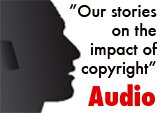If it ain’t broke? … Recommendations to update the SA Copyright Act
We live in a remix culture, where we borrow from existing works to form new works; where we use creations from before as starting points to our own ideas.
As digital consumers, we can use a song from the internet as background music for a photo presentation that we’ve put together for someone’s twenty-first birthday party.
We can add to and then forward funny emails to our friends … Upload photos and videos to Facebook … Embed a video from YouTube in a blog post.
It is a remix culture and we’re living it.
Does this mean that we are stealing someone else’s livelihood? Are we pirates, plagiarists and generally bad people?
Well of course we’re not bad people. But we need current rules and regulations to do 2 things:
- to reflect our reality and what we do practically in a digital environment as digital consumers, and
- to protect the rights of creators.
Recommendations
These recommendations are taken from a project entitled The African Copyright and Access to Knowledge (ACA2K) project which was an intensive research and review of the copyright acts of a number of African countries in relation to access to learning materials.
Members of the South African team have put together a concise, practical set of recommendations which has been compiled following doctrinal and qualitative analyses which included stakeholder interviews, literature reviews and the compilation of case studies.

Recommendation 1. Retain the current standard term of copyright
(Go South Africa; eets good good good, eets good, eets nice!)
Whilst some countries, such as the United States, have exceed the standard terms of copyright to as much as 70 years, South Africa has implemented the standard protection terms required by international conventions and treaties. This is a period of 50 years after the death of the author. Having a shorter rather than longer terms benefits the public as works then fall into the public domain quicker.
So the recommendation here is, if it ain’t broke, don’t fix it.

Recommendation 2. Address Orphan Works
(It’s a hard-knocks life for Orphans, and, as it turns out, for us too!)
Orphan works are works that are still copyright-protected but for which the copyright-holder is not identifiable or not locatable. Whilst the copyright holder is entitled to the benefits of copyright, if the author is unknown, there can be no transaction to secure the rights of the work by others. So, in a way, these works remain in a no-man’s land where they cannot be used.
The recommendation here is to permit the use of orphan works on reasonable terms when copyright owners cannot be identified or located to negotiate voluntary licences.
Recommendation 3. Align Promotion of Access to Learning Materials to Promotion of Access to Information and Communication Technologies (ICTs)
(Geeks rule, man!)
There is a free and open source software policy (FOSS) which is in discussion for government implementation. If this is implemented successfully, it could address and lower barriers to access - especially for schools and libraries.
To fully benefit from this, there is a recommendation to amend legislation to promote access to learning materials via ICTs. In any event, the SA government will need to ensure that the FOSS policy is compatible with other policies in related legislation, of which the Copyright Act is one.
Recommendation 4. Provide for Promotion of Access to Knowledge for the Disabled
(Currently things are sommer unfair to a large portion of the population!)
As it stands the Copyright Act doesn’t allow scanning, translation, adaptation or conversion of works for sensory disabled persons - such as sight or hearing impaired people - without having to get permission from the copyright holder. This creates a huge barrier to the access to knowledge in general, but to learning materials specifically. Getting permission from the copyright holder can be expensive, time consuming and often tied up in red tape.
The recommendation here would be to remove barriers to access to learning materials faced by people with disabilities. An example of a solution would be to allow the permission-free conversion of learning material into Braille or into audio-format.

Recommendation 5. Address the Conflict between the Copyright Act and the ECT Act
(Okay, you boffs our there, this one’s a little higher grade.)
There is a proposed act called the Electronic Communications and Transactions (ECT) Act of 2002 which could override copyright exceptions and limitations. It could do this by attaching criminal liability for use of a work that is in fact allowed under the Copyright Act. This means that there would be a conflict between two Acts.
The recommendation here would be to ensure that there is no conflict between the two. A proposed solution would be to declare the copyright exceptions and limitations contained in the Copyright Act are valid defences against any claims based on the ECT Act.
Recommendation 6. Review, Amend and Expand Copyright Exceptions and Limitations
(Let’s not sit on the fence here, guys! Time to get real, be specfic and let the dogs out!)
The current set of copyright exceptions and limitations (meaning, when it’s legally ok to override the exclusive rights set out for the copyright-holder) are vague and outdated. The use of modern technologies for us digital consumers and especially in relation to educational purposes, for example in distance education, remains generally something that hasn’t been considered. The exceptions and limitations (meaning, when it’s legally ok to override the exclusive rights set out for the copyright-holder) could help address technological advancements that can facilitate access to knowledge. Detailed and clear provisions for use by libraries, archives, educators and learners should be introduced.
The recommendation here is to adopt a detailed list of specific copyright exceptions and limitations … yes, you got it … when it’s legally ok to override the exclusive rights set out for the copyright-holder! And also, perhaps, to introduce an additional and subordinate catch-all phrase modelled after the fair use doctrine in the United States (check out buzzwords for more on fair use and fair dealing.)
Recommendation 7. Examine the Scope of Copyright Protection to Promote Public Domain
(The place where we all can share: share the work, share the ideas, share the love)
South Africa’s copyright protection should not exceed the standard scope of copyright protection required under the relevant international treaties and agreements. We need to acknowledge that the public domain is a robust, active, dynamic pool of information and materials that we can use and learn from. The public domain should be especially close to our hearts here in Africa, where stories, culture and knowledge have been passed on for centuries in a verbal manner from generation to generation. It’s something that needs to be understood, nurtured and protected by law.





